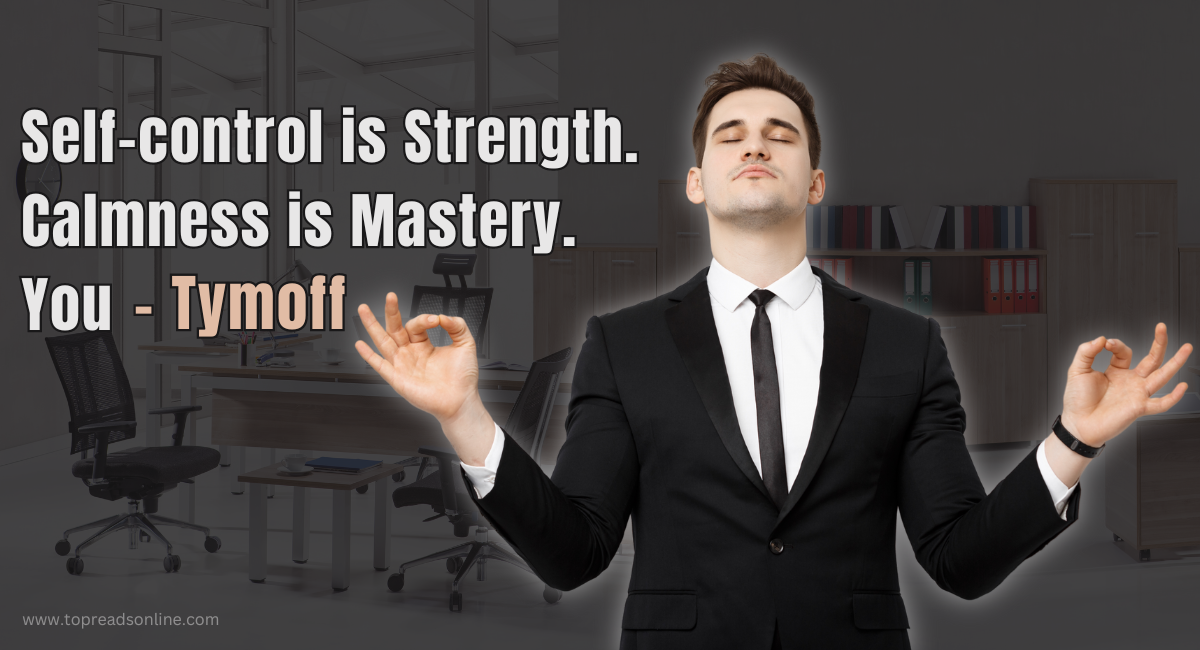Table of Contents
- Introduction
- The Essence of Self-Control
- Calmness as Mastery
- Integrating Self-Control and Calmness in Daily Life
- Challenges and Overcoming Them
- Conclusion
Overview
Calm as a mastery of self and self-control as a kind of personal power are becoming more and more important in a world full of diversions and never-ending demands. This profound realization is summed up in the saying, “Calmness is mastery; self-control is strength.” “You – Tymoff” serves as a light of hope for anybody attempting to achieve emotional equilibrium and personal development. This essay explores the consequences of this philosophy for both our personal and professional life, going deep into its subtleties.
The Fundamentals of Restraint
Self-control goes beyond simple self-restraint. It is commonly understood to be the ability to manage one’s emotions, thoughts, and behaviors. It is a fundamental quality that supports many facets of life, including interpersonal connections and decision-making. Understanding the complexity of self-control is a necessary step on the path to mastering it.
First of all, self-awareness and self-control are inextricably intertwined. Recognizing one’s urges, wants, and feelings deliberately is the first step towards it. Gaining control over one’s responses and decisions begins with raising awareness of this. It helps people to stay true to their ideals and long-term objectives instead of letting short-term feelings or other influences influence them.
Second, willpower and self-control are closely related. It would be more realistic to characterize willpower as a muscle that can be strengthened with exercise rather than as a finite resource as is frequently the case. Developing willpower entails teaching the mind to concentrate, withstand temptation, and endure hardship. This part of self-control is essential to reaching individual objectives, whether they job, relationship, or health-related.
Thirdly, there needs to be a balance between habits and self-control. Both positive and negative habits have a big impact on our behavior patterns. Developing healthy behaviors like consistent exercise, mindful eating, or effective time management might improve one’s capacity for self-control. On the other hand, overcoming negative habits demands a conscious and persistent effort at self-control.
Peace as Expertise
In the field of personal growth, calmness is in fact a type of mastery that is frequently disregarded. It stands for a condition of harmony and balance that enables people to face obstacles in life with calmness and clarity.
The ability to control one’s emotions is essential to serenity. It entails controlling and addressing a range of emotions in a composed way. People who have mastered tranquility are able to deal with stressful events without becoming emotionally overwhelmed. This ability promotes considerate and productive communication, which is crucial for resolving conflicts in both personal and professional relationships.
A further aspect of serenity is awareness. One of the most effective strategies for developing inner peace is to just be in the present moment, free from distraction or judgment. Deep breathing, meditation, and simply participating completely in everyday activities are examples of mindfulness techniques that can greatly improve one’s capacity for composure under pressure.
Moreover, peacefulness and resilience are closely related concepts. The capacity to overcome obstacles and failures is resilience. Resilience is enhanced by a calm mentality, which allows people to see challenges as chances for personal development rather than insurmountable roadblocks. This viewpoint encourages a proactive attitude to both personal growth and problem-solving.
Including Moderation and Peace of Mind in Everyday Activities
Integrating composure and self-control into daily life is a transforming process. It calls for dedication to one’s own development as well as regular practice.
first, Setting attainable and realistic goals is essential . Objectives serve as a road map for attempts toward composure and self-control. They give inspiration and guidance, which facilitates maintaining attention and averting distractions.
Secondly, it is beneficial to establish a program that includes exercises for improving composure and self-control. This might involve journaling, regular exercise, meditation, or other practices that enhance mental and emotional health. For these strategies to be effective, consistency is essential.
Thirdly, it’s critical to reflect on one’s development and ask for comments. Since personal development is a continuous process, it’s critical to acknowledge both your accomplishments and your room for progress. Feedback from reliable sources can offer insightful information and aid in the improvement of techniques for calming down and gaining self-control.
Obstacles and Getting Past Them
Gaining composure and self-control requires overcoming obstacles. Typical roadblocks include a lack of drive, outside influences, and internal tensions.
Building a support system is crucial to overcoming these obstacles. When experiencing challenges, friends, family, or professional counselors can offer support and guidance. Maintaining motivation and attention may also be facilitated by practicing self-care and learning stress management strategies.
Anticipating and making plans for future failures is another helpful tactic. Remaining resilient and persistent can be aided by realizing that learning is a process that involves obstacles and that the path is not straight.
In summary
The “self-control is strength” school of thought. Mastery is being at ease. “You – Tymoff” provides insightful advice on personal growth. We may attain a higher feeling of balance, fulfillment, and effectiveness in both the personal and professional spheres by accepting and incorporating these ideas into our life. We are always learning and growing on this path, and with every step, we get closer to being our best selves.




